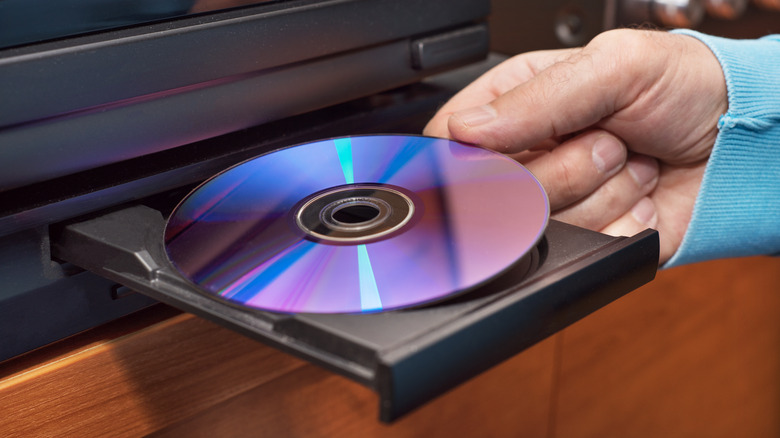Here's Why Your Old DVD Player Can't Read Blu-Ray Discs
While the war for the superior home media format is an ongoing one, it seems that Blu-ray has come out on top when it comes to tangible options. While it faces serious competition of its own from the likes of dominating streaming services, with declining sales even leading to some retailers beginning to phase out the format, dedicated diehards of physical media are unlikely to give up Blu-rays anytime soon.
Those still latched on to DVDs are in an even tighter corner, however. With physical media already having a tough enough time and further Blu-Ray advances such as 4K Ultra HD upping the game, regular DVDs are quickly becoming obsolete. Similarly, if you're attached to your DVD setup, it won't serve you any good as they are unable to handle Blu-ray discs. But why is that? DVDs and Blu-rays physically appear the same and their players seemingly operate in a similar fashion, so why is it necessary to overhaul your DVD player in order to use a Blu-ray? Like many aspects of the tech world, the devil is in the details.
Blu-rays contain more information than DVD players can handle
DVDs and Blu-rays are built practically the same, but given that Blu-ray players can play DVDs just fine, it seems strange that Blu-Rays themselves are unable to work on DVD players in the same way. The reason for this all has to do with the advanced way in which Blu-rays store information.
In order to support high-definition video modes such as 720p or 1080p, Blu-rays come equipped with specially designed pits that are far smaller than those of a DVD. To scan its dense storage of video and audio information, Blu-rays require blue laser technology, which is where the format's name originates. DVDs, on the other hand, utilize red lasers to scan their content, which can be read by either regular DVD or Blu-ray players. However, your average DVD player is unable to produce the blue lasers needed to activate a Blu-ray disc, resulting in their incompatibility. Thankfully, many manufacturers produce home media bundle packages that include both DVD and Blu-ray versions of the movie or show, giving buyers more options.
It's worth noting that 4K and Ultra HD Blu-rays will not play on standard Blu-ray players. Similar to the distinction between Blu-rays and DVDs, Ultra HD stores even more information, with as much as 100GB needed to support their higher quality formats. At the end of the day, it's worth obtaining a 4K or Ultra HD Blu-ray player so there's no worry about playing whatever physical format has your heart.

